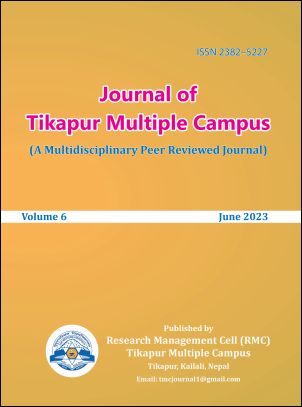Exploring the Risks and Benefits of Internet and Technological Devices for Children
DOI:
https://doi.org/10.3126/jotmc.v6i01.56370Keywords:
aggressive and unsocial, Impacts, technologies devices, social mediaAbstract
This study aimed to investigate the positive and negative impacts of internet and technological device son children aged 5-16 years in Birendranagar-6, Ganesh-Chowk, Surkhet. A sample of 60 children from 20 households was included in the study, with 13 children aged 5-8 years, 24 aged 9-12 years, and23 aged 13-16 years. Data was collected through interviews and analyzed using descriptive statistics. Results showed that 25% of the respondents had received information about internet and technological devices from radio/TV, while 40% had received information from friends, 15% from neighbors, and 20% from agents. The study revealed that children aged 5-8 years were not at high risk of internet and technological devices, but the risk increased for children aged 9-12 years. The study also found that children engaged in a range of online activities, including school work (85%), playing games (83%), watching video clips (76%), and instant messaging (62%). Fewer children posted images (39%) or messages for others to share (31%), used a webcam (31%), file-sharing sites (16%), or blogged (11%). Furthermore, the study found that internet and technological devices had negative impacts on children’s mental and physical health, as well as making them more aggressive and unsocial regarding potential risks associated with internet and technological devices and promoting safe and responsible.
Downloads
Downloads
Published
How to Cite
Issue
Section
License

This work is licensed under a Creative Commons Attribution-NonCommercial 4.0 International License.
This license enables reusers to distribute, remix, adapt, and build upon the material in any medium or format, so long as attribution is given to the creator. The license allows for commercial use.




